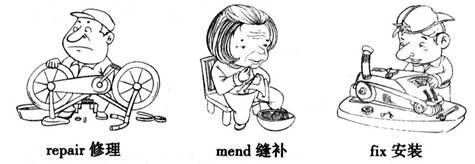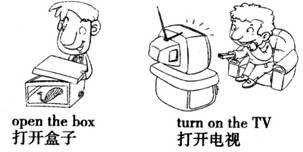| Unit 2 I’ll help to clean up the city parks.(II) |
一、知识概述
1.学习和掌握本单元出现的生单词、词组和句型。
2.学习和掌握动词不定式做宾语、状语和宾语补足语的用法。
3.学习和掌握情态动词could表建议的用法。
4.学习和掌握短语动词的含义和用法。
5.能听懂“帮助他人,参加社会公益活动”的相关话题及文章;掌握向别人求助或提供帮助的一些句式。
二、单元重难点解析
1.I’ve run out of it.
我已经把它用完了。
run out of 是“动词+副词+介词”的短语,of后接宾语,主语通常是表示“人”的名词,还可用于某种能消耗物品的机器等,意为“……用完了……”。
e.g.I’ve run out of paper.
我的纸用完了。
拓展:
(1)run out of 也可以表示“从……跑出来”的意思。
e.g.The dog ran out of the room.
这条狗从房间里跑了出来。
(2)run out是“动词+副词”结构的不及物动词短语,意为“用完,用尽”,主语通常是表示“时间、金钱”等无生命的东西。
e.g.All the money ran out by time.
所有的钱都被我花光了。
(3)sth. run(s) out表示“某物用尽了、用完了”。
e.g.Our food will soon run out.
我们的食物快吃完了。
2.I take after my mother.
我长得像我母亲。
take after 意为“像;与……相像”,指由于血缘关系而(在外貌、性格等方面)相似;相当于be similar to,其中after 是介词,其后常接名词或代词。
e.g.Your daughter doesn’t take after you at all.
你女儿长得一点也不像你。
拓展:
(1)look like 意为“看上去像……”,多指外貌。
e.g.You look like my brother.
你与我弟弟长得像。
(2)be like意为“像……”,可指外貌,也可指性格。
e.g.What is your sister like?
你妹妹的性格怎么样?
3.I repaired it.
我把它修好了。
repair为及物动词,意为“修理;修补;修缮(房屋等)”。
e.g.He repairs old furniture.
他修理旧家具。
辨析:repair, mend与fix
(1)repair比fix或mend正式,常用表示修补破损或有洞的东西。
e.g.Mary repaired the radio just for fun of it.
玛丽修理录音机只是为了消遣。
(2)mend着重指修补衣服上的洞、道路、屋顶或围栏等。
e.g.My mother mended clothes for me yesterday.
昨天我妈妈为我缝补衣服。
(3)fix侧重于“安装”,有时也用作“修理”常用来指修理机器、车辆等。
e.g.The workers are fixing the machine.
工作们在安装机器。
4.I’m similar to her.
我与她相似。
(1)similar为形容词,意为“相似的,相仿的”,在句中可作定语或表语。
e.g.My best friend and I have similar hobbies.
我最好的朋友和我有着相似的爱好。
(2)be similar to 意为“与……相似/相仿”。
e.g.My new dress is similar to yours.
我的新裙子与你的相似。
拓展:be similar in sth. 意为“在某方面相似/相仿”。
e.g.The two building are similar in style.
这两幢建筑在风格上相似。
5.I’m sure you know that this group was set up to help disabled people like me.
我确信你知道这个组织建立起来是为了帮助像我这样的残疾人的。
disabled为形容词,意为“丧失能力的,有残疾的”。它是由动词disable(使……失去能力)+后缀-d构成的。
e.g.We should help disabled people.
我们应该帮助残疾人。
It’s impolite to make fun of a disable man.
取笑一个残疾人是不礼貌的。
注意:able(形容词,有能力的)→disable(动词,使失去能力,使残疾)→disabled(形容词,丧失能力的,有残疾的)
6.Lucky makes a big difference to my life.
“幸运儿”对我的生活产生了很大的影响。
make a difference to 意为“(对……)产生影响”。 difference前面可加修饰词,如big, great 等;to是介词,其后可接名词、代词或动名词。
e.g.Education can make a big difference to the quality of a person’s life.
教育对一个人的生活质量有很大的影响。
The accident has made a great difference to his life.
这次事故对他的人生产生的重大的影响。
One false step will make a great difference.
失之毫厘,谬以千里。(谚语)
拓展:make no difference to意为“对……没有影响”。
e.g.It makes no difference to me.
这对我没什么影响。
7.Or imagine you can’t walk or use your hands easily.
或者想像一下你不能走或自如地用你的手。
imagine为动词,意为“想象;设想”,其后可接名词、代词、动名词或宾语从句。
e.g.Can you imagine life on the moon?
你能想象在月球上的生活吗?
I can hardly imagine Peter sailing across the Atlantic Ocean in five days.
我几乎不能想象彼得在五天内就横渡了大西洋。
Don’t imagine yourself to be always correct.
不要以为自己总是对的。
I can’t imagine what he looks like.
我想象不出他长什么样子。
8.Most people would never think about this, but many people have these difficulties.
大多数人从没考虑过这一点,但是许多人有这样的困难。
difficulty 此处用作可数名词,意为“困难;难题”,其形容词为difficult意为“困难的”。
e.g. He met with many difficulties when traveling.
他在旅行中遇到过许多困难。
拓展:
(1)difficulty表示抽象意义是的“困难”时,是不可数名词。
e.g.Bad planning will lead to difficulty later.
计划不周会给以后带来困难。
(2)have difficulty in doing sth.表示“在做某事方面有困难”。
e.g.I had great difficulty (in) doing the work.
做这项工作我觉得很困难。
9.I can’t use my arms or legs well, so normal things like answering the telephone, opening and closing doors, or carrying things are difficult for me.
我无法很好地使用我的胳膊和腿,所以一些诸如接电话、开关门、搬东西这些平常的事对我来说都很困难。
(1)open 动词,意为“打开,张开”,反义词为close.
open the window 打开窗
open your mouth 张开你的嘴
辨析:open与turn on
① open指将原来关着或合着的东西打开。
② turn on指转动或推上开关等打开。
拓展:open 还可作形容词,其主要用法如下:
① 开着的,反义词为closed。
e.g.All the doors are open.
所有的门都开着。
② 开张的,营业的
e.g.The shop is open from 9am to 6pm.
这个商店从早上9点到下午6点营业。
③ 开放的
e.g.Our country is open to the world now.
现在我们国家对外开放。
(2)carry为及物动词,意为“拿;提;扛”。
e.g.He always carries a small box in his hand.
他手里总拿着一个小盒子。
The bus was carrying 10 people when the accident happened.
事故发生的时候,公共汽车上载有10个人。
辨析:carry, bring, take与fetch
① carry不表示动作的方向,一般指随身携带,如“扛、提、运”等。
e.g.Please carry this bag for me.
请为我拿一下这个袋子。
② bring指把人或物从别处带到说话者所在的地方。
e.g.Bring the book to me, please.
请给我把书拿过来。
③ take指把人或物从说话都的地方带到别处去。
e.g.Take my box to the room.
把我的箱子拿到房间去。
④ fetch指到别处去把某人或某物带来或拿来。
e.g.She has gone to fetch water.
她去打水了。
10.Then one day last year, a friend of mine helped me out.
后来,去年的一年,我的一们朋友帮我摆脱了困境。
(1)a friend of mine 意为“我的一位朋友”,是一个双重所有格,相当于one of my friends。
e.g.A friend of mine named Paul received an expensive car from his brother as a Christmas present.
我的一个叫保罗的朋友收到他哥哥作为圣诞节礼物给他的一辆昂贵的小轿车。
(2)help sb. out 意为“帮助某人摆脱困境;帮助某人解决难题”。
e.g.Help them out as possible as you can.
尽可能地帮助他们摆脱困境。
I can’t work out this math problem. Please help me out.
我做不出这道数学家题,请帮我解决。
11.I love animals and I was excited about the idea if having a dog.
我爱动物,并且我对拥有一只狗的主意感到兴奋。
(1)excited形容词,意为“兴奋的;激动的”,可能作表语或定语。作表语时,主语一般为表示“人”的名词或代词;作定语时,一般修饰表示“人”的名词或代词。
e.g.Tom was very excited after hearing of the good news.
听到这个好消息后,汤姆非常兴奋。
The excited children are opening their presents.
兴奋报孩子们正打开他们的礼物。
辨析:excited与exciting
① excited“兴奋的,激动的”,多用来修饰人。
② exciting“使人兴奋的,刺激的,令人惊心动魄的,极其有趣的”,修饰物。
e.g.The boy was very excited when he heard the exciting news.
男孩听到这个令人兴奋的消息时很兴奋。
(2)be excited about 意为“对……感到兴奋,激动”。
e.g.I was excited about going to the zoo.
去动物园令我兴奋。
拓展:be excited to do sth. 对做某事感到兴奋
e.g.Jack was excited to travel there by plane.
杰克对于乘飞机去哪儿旅行感到很兴奋。
12.动词不定式
动词不定式是一种活跃的非谓语动词。它在句中可起名词、形容词或副词的作用,可在
句子中作主语、宾语、定语、状语或宾语补足语。动词不定式的形式是“to+形容词原形”,
但to有时要省略。动词不定式在具体运用时,用不用to,取决于谓语动词的用法。
(1)带to的不定式结构
① 能直接跟带to不定式结构的动词主要有:want, ask, tell, hope, learn, try, decide, forget, remember, like, love, stop 等。
e.g.She likes to play the piano.
她喜欢弹琴。
② 动词不定式的否定形式是在不定式前直接辊not, 即not to do sth. 。
e.g.Jim told me not to wake up Kate.
吉姆告诉我不要叫醒凯特。
(2)不带to的不定式结构
① 在固定词组had better之后。注意:had better do sth. 的否定形式是had better not
do sth.
e.g.You had better go home now.
你最好现在回家。
It’s cold outside.You’d better not go out,
外面很冷,你最好不要出去。
② 在let, make, see, feel, watch, hear 等感官或使役动词后,要跟不带to的动词不定
式作宾语补足语。
e.g.I made them give me the money back.
我迫使他们把钱还给我。
I didn’t see you come in.
我没看见你进来。
③ 在引导疑问句的why not之后。“Why not +不带to的不定式”是“Why don’t do …的省略,可以用来提出建议或劝告。
e.g. Why not go with us?
什么不和我们一起去呢?
Why not take a holiday?
= Why don’t you take a holiday?
为什么不休个假呢?
(3)动词不定式作主语
e.g.To master a language is not an easy thing.
掌握一门语言不是一件容易的事情。
动词不定式作主语时可以放在后面,而用it作形式主语放在原主语的位置上。
e.g.It’s necessary to find the witness.
有必要找到目击者。
(4)动词不定式作定语:动词不定式作定语,要放在它所修饰的名词或代词的后面。
e.g.I have nothing to say on this question.
对这个问题我无可奉告。
(5)动词不定式作宾语:有的及物动词要求跟复合宾语(即宾语+宾语补足语)。如果其中的宾语是不定式短语,则必须将形式宾语it放在宾语的位置上,而将不定式短语(真正的宾语)放在宾语补足语之前。
e.g.I find it useful to learn English well.
我发现学好英语很有用。
助记:
只跟动词不定式作宾语的动词 决心学会有希望(decide, learn, wish, hope); 同意计划莫假装(agree, plan, pretend); 忘记拒绝会失败(forget, refuse, fail); 准备设法来帮忙(prepare, try, manage, help); 提供请求负担起(offer, beg, afford); 记得阻止理应当(remember, stop, be supposed); 以上后跟不定式,劝君牢记永不忘。 |
(6)动词不定式作宾语补足语
动词不定式作宾语补足语是动词不定式用法的一个重点,学习时要注意以下三种情况:
① 作动词ask,like,tell等的宾语补足语时,动词不定式符号to不可以省略。
e.g.He asked me to talk about English study.
他请我谈谈英语的学习。
② 作使役动词let,have,make以及感官动词feel,hear,see,watch等的宾语补足语
时,动词不定式符号to要省略。
e.g.The teacher made him say the word like this.
老师让他像这样说这个单词。
③ 作动词help的宾语补足语时,动词不定式符号to可以带,也可以不带。
e.g.Could you help me(to) carry the heavy box?
你能帮我搬这个重箱子吗?
(7)动词不定式作状语:动词不定式及其短语具有副词的特性,可在句中用作状语。
① 放在句首也可以放在句尾表示目的等。
e.g.He stopped to have a rest.
他停下来休息。
② 跟在作表语的形容词或过去分词的后面。
e.g.I’m sorry to hear that.
听到这件事我很难过。
③ 用在too… to结构中。
e.g.He is too young to understand all that.
他太年轻了,不能理解这件事。
- 返回 -

